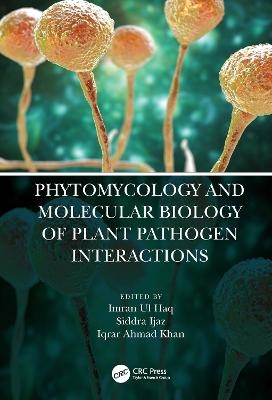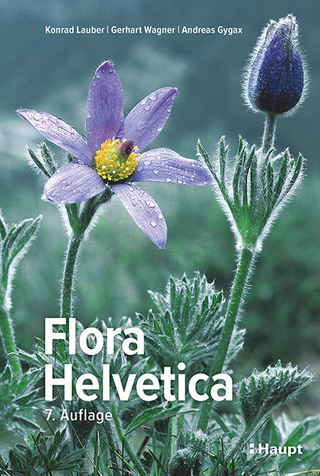
Phytomycology and Molecular Biology of Plant Pathogen Interactions
CRC Press (Verlag)
978-0-367-75506-5 (ISBN)
Plants are exposed to highly diverse microbiota forming complex interactions in natural environments. Phytomycology and Molecular Biology of Plant Pathogen Interactions presents information on defense mechanisms of the plants, as various microbes can have positive effects on their plant hosts.
Key Features
Delineates the journey from Koch’s postulate to molecular systems biology.
Provides comprehensive information on fungal biology, pathogenicity genes, and their expression while interacting with host plants.
Highlights the techniques and approaches involved in phytofungi identification and detection.
Describes multi-omics approaches and metabolic engineering in plant fungi.
This book is beneficial to readers including plant scientists and researchers, particularly plant pathologists, molecular biologists, and mycologists.
Dr. Imran Ul Haq holds a postdoctorate in plant pathology from the University of California, Davis, United States. He is currently an associate professor in the Department of Plant Pathology, University of Agriculture Faisalabad, Pakistan. He has supervised over 40 graduate students for M.phil and PhD and was responsible for the establishment of the Fungal Molecular Biology Laboratory Culture Collection, an affiliated member of the World Federation for Culture Collections in the Department of Plant Pathology, University of Agriculture, Faisalabad, Pakistan. He has published over 50 research articles, five books, four laboratory manuals, and several book chapters. He has made colossal contributions to fungal taxonomy by reporting novel fungal pathogen species in plants. His research interests are fungal molecular taxonomy and nanotechnology integration with other control strategies for sustainable plant disease management. Dr. Siddra Ijaz holds a postdoctorate on CRISPR/Cas technology for genome editing from the Plant Reproductive Biology Laboratory, University of California, Davis, United States. She is currently an associate professor at the Center of Agricultural Biochemistry and Biotechnology, University of Agriculture Faisalabad, Pakistan. She also serves as the deputy managing editor of an international impact factor journal, Pakistan Journal of Agriculture Sciences. She has supervised over 50 MPhil and PhD students and has published more than 50 research articles, six books, and several book chapters. Her research focus includes plant genome engineering using transgenic technologies, genome editing through CRISPR/Cas systems, nanobiotechnology, and exploration of genetic pathways in plant–fungus interactions. Dr. Iqrar Ahmad Khan has a distinguished career in horticulture/botany spanning more than four decades. He is a graduate of the University of Agriculture, Faisalabad, Pakistan, and the University of California, Riverside, United States. He has supervised over 70 graduate students, including 14 PhD candidates. He has undertaken 44 research projects and published 375 articles and books. He served as the vice-chancellor of two universities for more than nine years (2008–2017) and founded five new universities and district campuses between 2008 and 2017). He has also established several national and international research centers and institutes, including Chinese Confucius Institute and Bio-Energy Institute. He was Chief of Party/director of the US–Pak Center of Advanced Studies (2017–2019) and Ela Bhatt Professor at the University of Kassel, Germany (2020). His research on wheat, potato, orange, mango, and dates has benefitted industry and significantly improved the life and livelihood of farmers and rural communities. He is a Distinguished National Professor and a fellow of the Pakistan Academy of Sciences. He was awarded Sitara-e-Imtiaz for his services by Pakistan’s president and Ordre des Palmes Academiques by the French government for his international contribution to education.
Chapter 1: A Journey from Koch's Postulate to Molecular System Biology
Chapter 2: An Insight into Fungal Biology
Chapter 3: Fungal Genome and Genomics
Chapter 4: Pathogenicity Genes
Chapter 5: Molecular Mechanisms Relayed Defense Responses in Plants against Fungal Pathogens
Chapter 6: Fungal Gene Expression and Interaction with Host Plants
Chapter 7: Biotechnological Interventions in Fungal Strains Improvement
Chapter 8: Molecular Identification and Detection of Phytofungi
Chapter 9: Underpinning the Phylogeny and Taxonomy of Phytofungi through Computational Biology
Chapter 10: Application of System Biology in Plant-Fungus Interaction
Chapter 11: Mycorrhizal Symbiosis: Molecular Mechanism, Application and Prospects
Chapter 12: Multiomics Approach and Plant-fungal Interaction
Chapter 13: Metabolic Engineering of Plant Fungi for Industrial Applications
| Erscheinungsdatum | 21.07.2022 |
|---|---|
| Zusatzinfo | 2 Tables, black and white; 22 Halftones, black and white; 22 Illustrations, black and white |
| Verlagsort | London |
| Sprache | englisch |
| Maße | 156 x 234 mm |
| Gewicht | 548 g |
| Themenwelt | Naturwissenschaften ► Biologie ► Botanik |
| Naturwissenschaften ► Biologie ► Mykologie | |
| Weitere Fachgebiete ► Land- / Forstwirtschaft / Fischerei | |
| ISBN-10 | 0-367-75506-8 / 0367755068 |
| ISBN-13 | 978-0-367-75506-5 / 9780367755065 |
| Zustand | Neuware |
| Haben Sie eine Frage zum Produkt? |
aus dem Bereich


